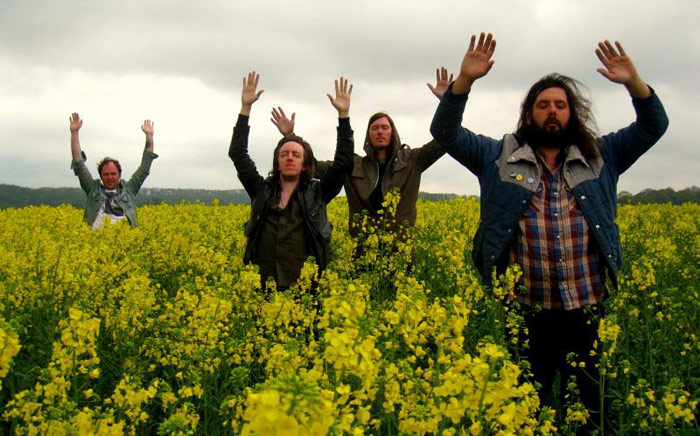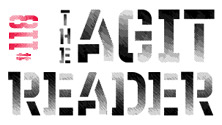
Is It Really So Strange?
by Stephen Slaybaugh
San Francisco’s Fresh & Onlys have amassed an impressively large discography in a short time (three full-lengths and a large stack of EPs and 7-inch singles in just a couple years). But what’s most astounding is not the amount of music the band has released, but the Fresh & Only’s unyielding ability to meld melody and turbulence in a synergetic mix of psych echoes and modern garage stomp.
The Fresh & Onlys began as a recording project between Amoeba Music coworkers Tim Cohen (guitar and vocals) and Shayde Sartin (bass), but since gelling with Wymond Miles (guitar) and Kyle Gibson (drums) after a couple other line-ups, the band has hit its stride. Nowhere is that more apparent than on album number three, Play It Strange, which comes out this week on In the Red. With the increased fidelity that eschewing their Tascam 388 for recording in a studio afforded them, the record is blanketed in warm layers of guitar reverberations. Tracks like “Waterfall” and “I’m a Thief” reveal a dark beatitude, with the band delving into a bottomless pool of timeless melody. Few records this year are this potent.
I caught up with Shayde via phone to talk about the new record, amongst other things.
You guys have been in lots of other bands prior to the Fresh & Onlys. Have those been put to rest to focus on the Fresh & Onlys?
Shayde Sartin: Yeah, totally. We still do other things—Tim has his solo thing; I’ve been collaborating with Jeremiah McIntyre of the Box Elders on some stuff, just real casual. When I first started doing Fresh & Onlys, I was in Personal and the Pizzas and Sonny & the Sunsets and doing a bunch of random stuff, but Fresh & Onlys took over and became overwhelming. That’s all we really do anymore.
The band has taken off in comparison to some of your other projects. Do you think that’s just a matter of finding the right people to work with or are you guys just late bloomers?
SS: Late bloomers, man! I’ve always had a fascination with being a late bloomer, but actually it’s the chemistry of the four of us working together. Initially, it was just me and Tim. It was feeling good—we were making a lot of songs and the magic was there and the excitement was there—but when we became a full band it seemed more solid and a little more together.
Was there a specific instance that made you and Tim decide that it needed to be a band rather than just a recording project?
SS: We had made these demos—I don’t want to even call them demos because to us we were making records—and we played them for people and they were really responsive. That response encouraged us to try it live. We had a different guitar player and a different drummer originally, but seeing people take an interest in it, we realized it was something we should take more seriously. When we got Wymond and Kyle—our current line-up—it was like, “Okay, this is a real band. We need to keep doing this.” For me, the instance when Wymond joined the band made a huge difference because he brought something out of the songs that I couldn’t bring out and that Tim couldn’t bring out. I realized that the three of us were going to be a solid collaboration.
From reading other things, it sounds like in the past that the equipment, like the Tascam, was pretty integral to the music you were making...
SS: Yeah, it was as important as a guitar in the beginning.
So what made you decide to go into a studio for this record?
SS: I didn’t want to get stuck in the mud of being a lo-fi band or doing the same thing over again sonically. We had written and recorded a lot of songs and I started seeing us regurgitate ideas that we had already gone through. We also wanted a challenge and to make sure it was something we could do: go into a studio and let someone else do stuff. We still record on the 388, but we also do stuff elsewhere. It’s not like we abandoned home-recording.
Did you have these songs written beforehand? I mean, did they warrant this treatment?
SS: What happened was we tried recording the album in its entirety on our own and that is what spawned the idea to go into a studio. We recorded the whole record and we were listening to it. I was like, “Man, this is really nothing new from what we did on the last two records or any of the 7-inches. We need to challenge ourselves to do something a little more broad sonically and a little more enriched.” We had just gotten back from tour and had a lot of momentum. We went in the studio and banged out the basic tracks really quickly. Tim Green at Louder Studios, where we recorded it, had a lot of instruments that we never had at our disposal—barritone guitar, piano, synthesizers—and we weren’t bogged down running cables ourselves or running from one room to the other to hit record, things that get in the way of performance. It was pretty rad.
Tim has described this record as a “real” record. Do you feel the same way?
SS: Not necessarily. I mean, that’s just Tim saying something carelessly. I think they’re all real records. There certainly are things looking back that I would have done differently, but I love every release that we’ve put out. I feel like we’ve edited ourselves pretty well for the amount of songs we’ve recorded. We haven’t done anything we’re ashamed of—in fact, I’m sure we haven’t done anything we’re ashamed of or that we’ll ever be ashamed of. If you look at our discography, I think you’ll see growth consistently and that’s what matters the most.
But did you at all feel like stepping up to In the Red, which probably has a little more distribution, that you had to do something a little more serious?
SS: No, not at all. We approached the last record just as seriously as we did this one. It’s just a matter of where you’re at at the time. We would have recorded this album the same way if it was for a label half the size of In the Red. It just so happened that we were fortunate to have In the Red do a record with us and In the Red was able to give us money to record, which is something we didn’t have. So it was two opportunities at once. It wasn’t a lot of money, but it was enough money to make the record we absolutely wanted to make.
Do you envision the band continuing to be as prolific as far as putting stuff out or will you maybe save songs to go into a studio like you did this time?
SS: I do want to cool down a bit. I don’t think it’s the wisest thing to put out so much stuff all the time and expect people to grow with you. At some point, you have to start editing yourself even more. Bands don’t last forever. I don’t know how long this band will last, but I’m going to enjoy it and only do it—and we all feel this way—while it feels right. I do want to spend a little more time with releases and recordings in the future, but that’s not to say we’re going to hold it to one record every year or two. We’ll probably still put out a lot of 7-inches, just because we record so much. We write and record constantly. Tim and I have a really beautiful—god no, I don’t like that word beautiful—we have a really healthy writing relationship that’s conducive to that kind of thing.
Yeah, it sounds like you try not to censor yourselves.
SS: Yeah, that’s a huge part of the process, not censoring ourselves in the creative process. We censor ourselves after the fact. We don’t put out everything we record. If you were to dig through all the tapes and CDRs lying around, you’d be like, “Man, that is a terrible song!” But we don’t put those out. We don’t spend time secondguessing our muses or our inspiration. We just do it and if it turns out bad, it turns out bad. You throw it aside. But it’s important to let everything happen.
You’ve been aligned with the current psych scene in San Francisco. Do you see it as part of the city’s great musical lineage? Do you think that musical history has something to do with the current revival?
SS: I wonder that myself all the time. I have no idea. I would like to think so because that music inspires us a lot. Everything from the Summer of Love to the early ’80s and the post-punk movement of Factrix and Survival Research Laboratories—all that stuff inspires us. To me, it’s all the same lineage of psychedelia. I see us as a pop band, though we certainly have psychedelic qualities. I’ve always thought that psychedelia is in the eye of beholder. I think it was George Harrison who said that psychedelic music is any music listened to under the influence of psychedelics. I don’t think you can make music that sounds psychedelic. You have to hear it as psychedelic music. To me, Strawberry Alarm Clock is not psychedelic music. It’s like shitty Monkees music. It’s not psychedelic; it’s mimicing something. I despise Strawberry Alarm Clock more than reason! To me Buddy Holly is some of the most psychedelic music I’ve ever heard.
